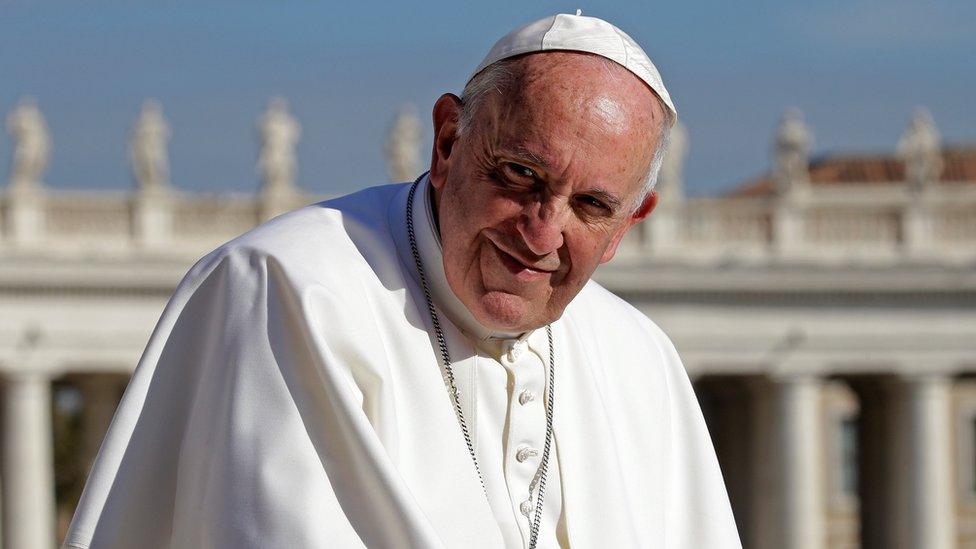Pope Francis urges the 'pursuit of truth' in Sri Lanka
- Published
The Pope's trip comes at a significant time for Sri Lanka, as Yogita Limaye reports
Pope Francis has called for the "pursuit of truth" in Sri Lanka as he visits a country still grappling with the legacy of a long civil war.
Crowds and ceremonial dancers welcomed the Pope as he arrived in Colombo.
It is the first papal visit since the end of the war in 2009 that saw the army and Tamil rebels accused of atrocities.
The country's new president has promised an end to repression of religious minorities.
Speaking on the tarmac of Colombo's international airport, where he was met by the new leader, Maithripala Sirisena, the Pope said that peace could be found by "cultivating those virtues which foster reconciliation, solidarity and peace".
He said that the "pursuit of truth" was important, "not for the sake of opening old wounds, but rather as a necessary means of promoting justice, healing and unity".
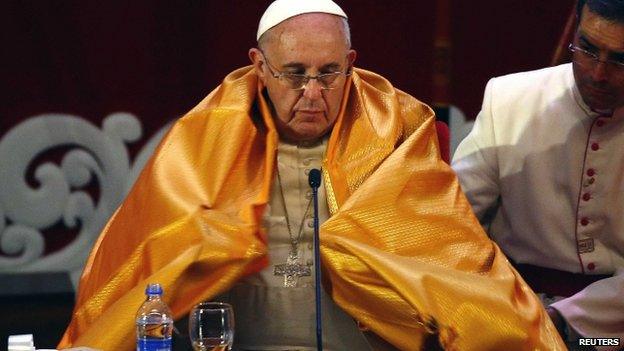
Pope Francis donned a saffron robe at a multi-faith meeting, a Tamil sign of honour

At the scene: Yogita Limaye, BBC News
All along the 20km (12 miles) highway leading up to the airport crowds gathered on both sides of the road to catch a glimpse of Pope Francis.
Some opened up umbrellas, a few elderly brought portable seats along as they waited under the hot Colombo sun.
Lalith and Therese Fernando, a couple from Chilau that is nearly 100km (60 miles) from here, took a train at 05:00 this morning to be here. "It's a once in a lifetime opportunity," Lalith told me.

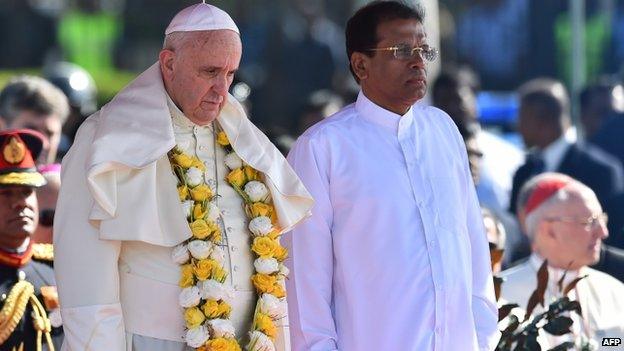
He was greeted on arrival by the new Sri Lankan President Maithripala Sirisena
He later told a meeting of religious leaders "what is needed now is healing and unity, not further division and conflict".
A motorcade drove Pope Francis into the centre of Colombo, past crowds and troupes of decorated elephants.
Tired by the hot sun and late, he had to cancel a planned meeting with Sri Lankan bishops.
But he later met President Sirisena at his official residence and attended the multi-faith meeting.
On Wednesday he is celebrating a mass in Colombo where he will canonise Sri Lanka's first saint, the 17th Century missionary Joseph Vaz. One million people are expected to attend. Later he will speak at prayers in Madhu in the north - a region which saw some of the fiercest fighting of the war.
Pope Francis is in Asia on a six-day tour. He will next travel to the Philippines.
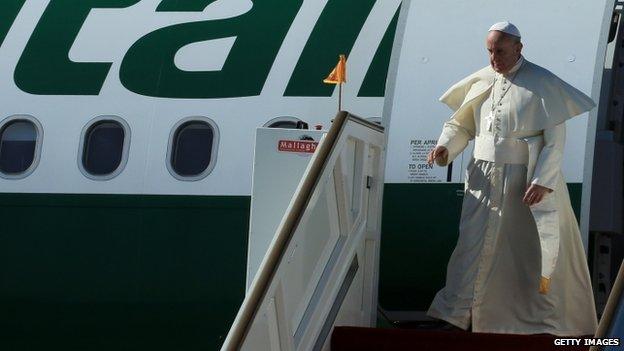
It is the second Asia tour for Pope Francis in less than six months
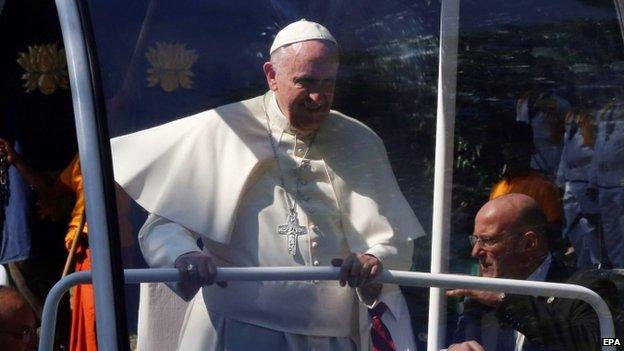
The Pope is hoping to win new followers with his visit. He will also travel to the Philippines
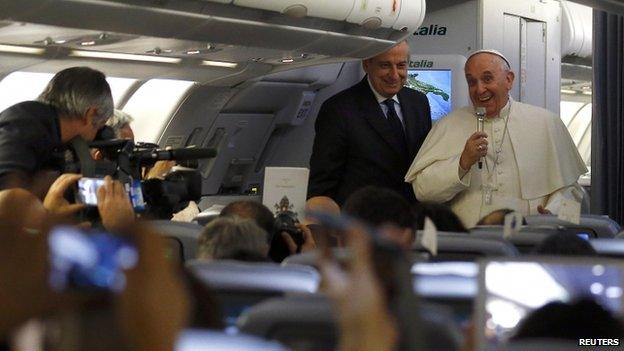
The Pope was accompanied on the trip by a large group of reporters
Sri Lanka's brutal 26-year long civil war ended in 2009 when the army defeated separatist minority Tamil rebels. The United Nations said both sides committed atrocities against civilians.
The government consistently denied allegations that it was responsible for the deaths of many thousands of civilians in the final phase of that war. Last year the UN approved an inquiry into alleged war crimes.
Just over 7% of Sri Lanka's population are Christian, mostly Catholic - but they include both Sinhalese and Tamils. About 70% of Sri Lankans are Buddhist, with 13% Hindus and 10% Muslims.
During the last papal visit 20 years ago, Pope John Paul II was boycotted by Buddhist leaders. But on this visit, the Pope is expected to hold a multi-faith prayer meeting which should include moderate Buddhist representatives.
The BBC's religious affairs correspondent Caroline Wyatt says Buddhist fundamentalism has grown as a force in Sri Lanka since the last papal visit, with some waging a violent campaign against Muslims on the island.
Pope Francis wants to encourage the local church to seek partners in peace, so that all religions can stand united against any further violence or intimidation by religious extremists, our correspondent says.
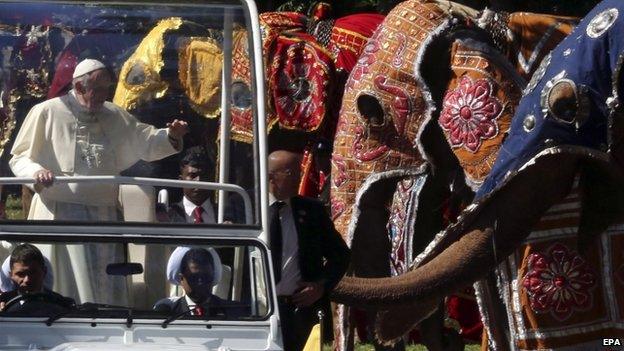
Even the elephants were dressed up for the Pope's visit
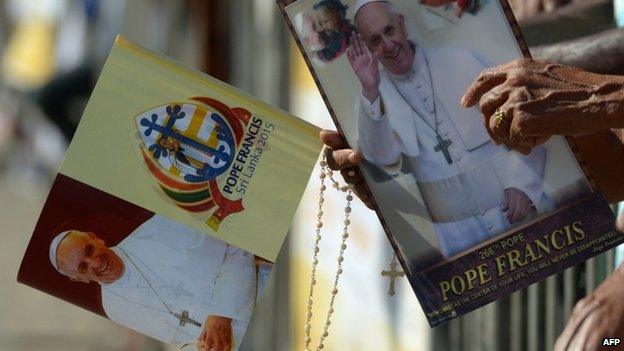
The visit has been eagerly awaited by Sri Lankan Catholics
It is a time of significant change in Sri Lanka, where Maithripala Sirisena took office as president on Friday.
He ended the decade-long rule of former President Mahinda Rajapaksa, a period which critics said had been marred by increasing corruption and authoritarianism.
There have been signs of reform under the new leader, with Mr Sirisena inviting exiled journalists back to Sri Lanka and unblocking censored websites.
But it is not yet clear if his approach to addressing the legacy of the war will differ from his predecessor, who is seen as a hero by many Sri Lankans for ending the conflict.

Travelling with the Pope: Caroline Wyatt, BBC religious affairs correspondent
Suddenly, Pope Francis is in front of me, looking at me, and I introduce myself in faltering Italian.
He is a commanding presence, and utterly unfazed by being filmed by so many cameras surrounding him. It must be something you get used to as pontiff.
What does he expect from this trip, I ask him. He bends down closer to offer an ear as he tries to decipher my appalling accent, and gives a big smile - "we'll see", he says, raising an eyebrow, and then "onwards!"
He gives my arm a warm pat as he goes on to the next row, never hurrying, but spending just long enough to make as many people on the plane feel they have had their time close-up with the Pope.

The Pope's trip, which comes five months after a tour of South Korea, is being seen as an attempt to win new followers in Asia and to shore up support for the region's millions of Catholics.
In the Philippines, organisers are expecting one of the biggest crowds ever for a papal visit when Pope Francis conducts an open-air mass in the capital Manila.
Church officials say his visit to the archipelago nation will focus on "mercy and compassion" following a deadly 2013 typhoon, reports the AFP news agency.
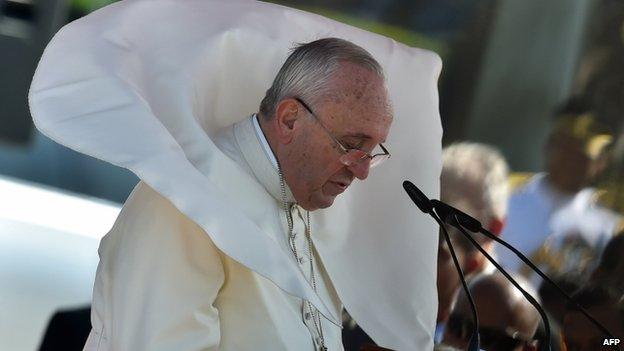
A gust of wind blew the Pope's mantle as he delivered the speech in Sri Lanka
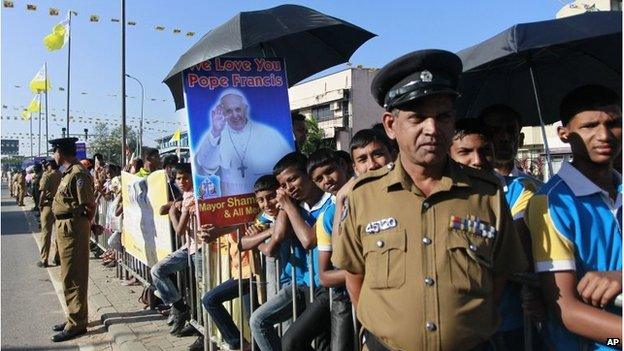
Crowds lined the streets of the capital, Colombo, to greet the Pope
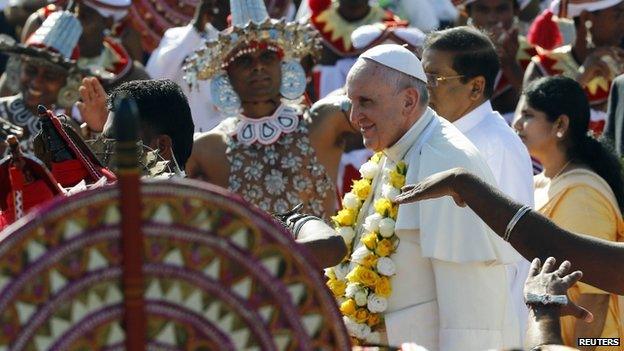
Pope Francis' visit comes just after the decade-long rule of Mahinda Rajapaksa came to an end
- Published13 January 2015
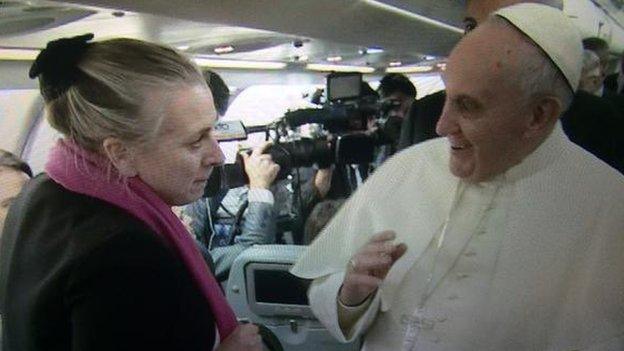
- Published3 October 2014
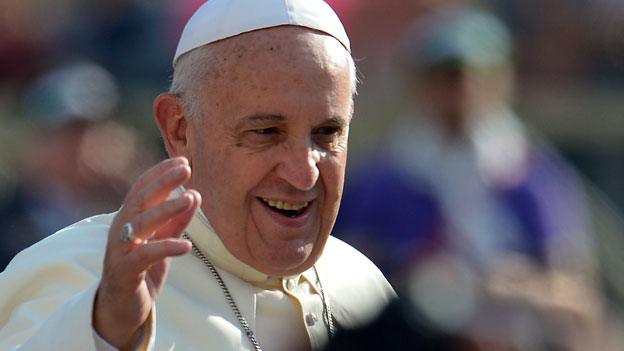
- Published7 January 2014
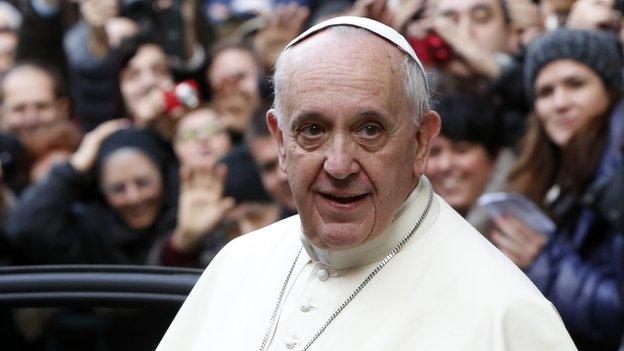
- Published28 October 2022
